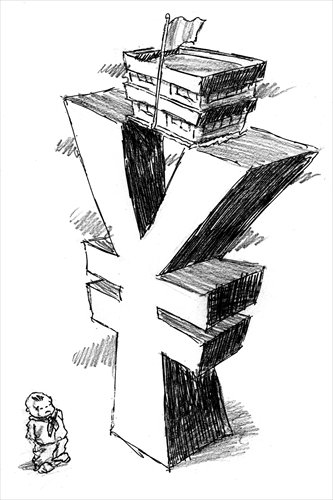Tiny apartment comes with high school price tag

Illustration: Peter C. Espina/GT
My cousin's six-year-old girl is due to start school next year, but it's her mother who has the jitters. The area where she lives doesn't have good primary schools, and she wants to move to a better district. But what's depressed her most is that a tiny apartment measuring only 4.4 square meters in Beijing's Xicheng, a popular school district, recently sold for 1.35 million yuan ($220,500). The price, however, is several times that of apartments outside the catchment area nearby.
In many Chinese cities like Beijing, public kindergartens and primary schools only admit children who live locally and who posses an official hukou (residence permit). Therefore, owning a home is the first step to get into the right kindergarten, followed by a good primary school, a reputable high school, and finally, a prestigious university.
My cousin is not the only one in Beijing willing to sacrifice comfort for kids. Young, newly married couples whose families have certain fortune would like to choose houses in catchment area regardless the hiking prices, taking into consideration the education of their future kids.
But the record high housing price in Beijing is certainly not normal. Catchment area is not limited to China. In developed countries like the US, the UK and Japan, parents also take schools into consideration when picking where to live.
Research by British estate agents in April shows that house prices in the catchment areas of the UK's most popular schools are much higher than those outside the areas. But even in areas around Henrietta Barnett, a prestigious grammar school in London, house prices are higher by only 146 percent, nowhere near the gulf in Beijing.
What explains the phenomenon is not only the lack of educational resources in China, but also the over-emphasis on academic degrees and the emerging and vast chasm between the urban elite and the rest of the country.
China has seen an unprecedented expansion in its higher education sector since 1999. Educational status, to a large extent, is closely associated with social status, thus resulting in a rash of officials and businesspeople with dubious "PhDs" awarded in return for political or economic favors, or purchased from diploma mills in the US.
Now a bachelor's degree is not enough to get you a ticket for a good job. "Don't let your children lose at the starting line" is a catchy slogan for eager parents.
Meanwhile, the shocking housing prices behind the fierce competition for education resources are also related to social welfare. In developed countries, outside of the US with its crippling educational debt and lack of safety nets, even if a school isn't so prestigious, the students can still be assured they'll have access to healthcare and housing. But in China, the contrast between different sectors is apparent.
Lack of education resources and social inequality are among the most frequently discussed social issues in China as the city's skyscrapers are matched by equally high prices. The problems cannot be solved overnight, but if we don't tackle them, we risk creating a permanent class of haves and have-nots, educationally and financially, that will haunt us for generations.
The author is a reporter with the Global Times. wangwenwen@globaltimes.com.cn